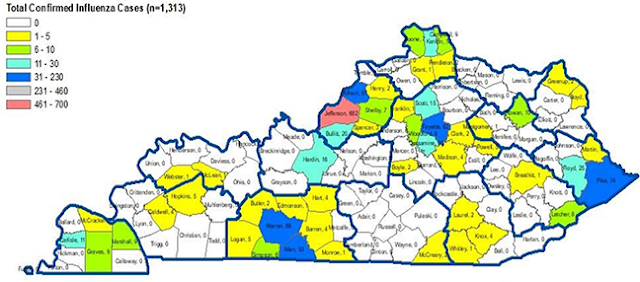By Melissa Patrick
Kentucky Health News
Influenza cases in Kentucky continue on the rise, and health officials say it’s not too late to get your flu vaccination. Flu season typically peaks in February, but runs through May.
“It is very important that people get their flu vaccine,” said Brooke Hudspeth, chief practice officer at the University of Kentucky College of Pharmacy. “We know that flu vaccines work and they are very well tolerated. And they are a key way to help prevent complications that we see from the flu.”
The latest weekly report from the state Department for Public Health shows that in the week ended Dec. 18, Kentucky counted 618 new flu cases, up from 402 the previous week, an increase of nearly 54%. That followed a week in which the state saw a jump of 106%. The state has recorded 1,313 cases this season. No flu-related deaths have been reported this year.
Fewer adults in Kentucky got a flu vaccine last season, but the state also saw a big drop in cases. During the same reporting week last year, Kentucky had only two confirmed cases of the flu, and a total of 127 for the season.
The drop was likely due to the strict public-health measures taken against Covid-19, such as masking and social distancing.
According to the
Centers for Disease Control and Prevention, the number of adults getting a flu vaccine in Kentucky dropped to 44.9% in the 2020-21 flu season, compared to 48.4% in the 2019-20 flu season.
A county-by-county report shows that Jefferson County, which has more than 750,000 people, had the highest number of cases, reporting 262 in the week ending Dec. 18. Other counties with the highest number of cases that week were Allen, 70; Warren, 42; Pike, 42; Oldham, 28; Fayette, 27; Jessamine, 22; and Floyd, 17.
State Health Commissioner Steven Stack has repeatedly encouraged Kentuckians to get both a Covid-19 vaccination or booster and a flu vaccine.
“With Covid-19 cases escalating and the added threat of circulating flu viruses, it is imperative that every Kentuckian take the essential steps to protect themselves, their loved ones and their communities,” Stack said in a news release.
Hudspeth said it is safe to get both the Covid-19 vaccination and the flu shot at the same time, and it’s important to get both, since having Covid-19 and the flu at the same time can increase a person’s risk of severe complications.
“If you are vaccinated, you are less likely to get the flu and spread the flu to those at greatest risk for becoming dangerously ill, including young children, pregnant women, people 65 and older and those with underlying medical conditions,” said Stack.
At a Dec. 18 news conference, Stack said this year’s flu vaccine should be quite effective because it contains the H3N2 strain, which is the one that is circulating. “So this year’s vaccine should be very helpful,” he said.
Flu shots are recommended for everyone six months and older and are strongly encouraged for people who may be at higher risk for complications or negative consequences.
Kentucky has a long way to go to get all of its adults vaccinated against the flu.
A
Foundation for a Healthy Kentucky poll, taken Aug. 4 through Sept. 4, found that almost two-thirds of Kentucky adults said they are very or somewhat likely to get the vaccine by the end of the year; 28.4% said they were very unlikely to get the flu vaccine and 5.9% said they were somewhat unlikely to get it.
Kentucky’s influenza level is considered to be widespread, a classification that is applied when increases in flu cases have been confirmed in at least half of the state’s 16 regions.
